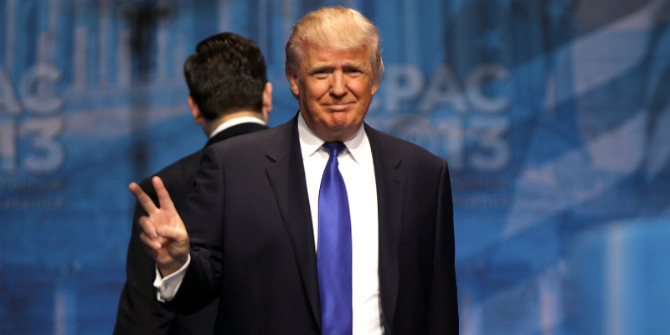 President Trump recently promoted the rhetoric of the far-right Britain First organization, which prompted an angry response from the UK’s Prime Minister, Theresa May. Ben Margulies writes that the transatlantic Twitter spat shows that Trump’s appeal to populism and anti-elitism may undermine the post-World War II liberal world order that the US-UK special relationship exemplifies.
President Trump recently promoted the rhetoric of the far-right Britain First organization, which prompted an angry response from the UK’s Prime Minister, Theresa May. Ben Margulies writes that the transatlantic Twitter spat shows that Trump’s appeal to populism and anti-elitism may undermine the post-World War II liberal world order that the US-UK special relationship exemplifies.
At this stage, there might seem to be little more to say about why Donald Trump makes an inflammatory use of Twitter. From his attacks on NFL players and ESPN commentators to how now especially infamous retweets of Britain First videos, President Trump clearly uses the social network to advance a radical-right populist, ethno-nationalist worldview. There’s an enemy. It’s not white. The elites won’t tell you the truth about them, but I will. Rinse and repeat.
However, the Britain First incident had a brief second act which raises new questions about American conservative populism. After British Prime Minister Theresa May condemned Trump’s use of the Britain First videos, Trump openly criticized her on Twitter, implying that she had failed to combat “Radical Islamic Terrorism” in Britain itself. Now, this reaction may be easy to explain: Trump is notoriously thin skinned, and perhaps his response to May was simply the reaction of someone who will not brook criticism from any source.
But could Trump’s reaction tell us something deeper about the populist mindset? After all, Britain and the United States form a “Special Relationship,” a uniquely close alliance. Even George W. Bush, a president famed for his impatience with multilateralism and the United Nations, treasured and relied on the US-UK alliance. When Obama warned Britons in April 2016 that Anglo-American trade ties could suffer if the UK chose Brexit, Trump praised a “great alliance” and criticized his predecessor. But does Trump truly value the Special Relationship? What does a radical-right populist movement – one predicated on the rejection of elites and extreme chauvinism – mean for a country’s alliances with foreign powers?
Populism is a thin-centered ideology focused on anti-elitism and unfettered popular sovereignty. The radical-right variant is “nativist” and “xenophobic,” and tends to be hostile to multilateral or supranational forms of government, but beyond that, populism rarely lends itself to a specific foreign policy. Like-minded nationalist governments may form close ties, like the Bolivarian Alternative for the Americas (led by Venezuela), or Hungary’s recent rapprochement with Russia.
It would seem axiomatic that Trump’s chauvinism and aggressive nationalism would be the greatest threat to continuity in American foreign policy. However, it may actually be anti-elitism that ends up undermining the Special Relationship. Ultimately, foreign policy, and the established channels through which it flows, are elite matters, handled by professionals in arenas removed from electoral politics. In Wolfgang Streeck’scriticisms of European political economy, he pointed out that the European Union converts much of political life into foreign policy, which is usually conducted secretively, by the executive branch, with little popular input. The US is not part of any supranational entity like the EU, but American foreign policy is not much less insulated from popular politics. The Constitution vests foreign relations in the presidency precisely because it can act with “secrecy” and “dispatch,” as John Jay wrote in Federalist Paper No. 64.
Trump’s administration has already demonstrated it has little particular concern for the professional diplomatic corps, proposing radical cuts and restructuring to the State Department, leading to charges of widespread demoralization in the agency. Typically, presidents choose former generals (George Marshall, Alexander Haig, Colin Powell), senators (Hillary Clinton, John Kerry) or academics (Henry Kissinger, Madeleine Albright, Condoleezza Rice) to run the State Department. In Rex Tillerson, Trump appointed an oil company CEO who had never held political office, and his ambassador to the UN is a former governor of South Carolina.
 “Lie Lie Land” by duncan c is licensed under CC BY NC 2.0
“Lie Lie Land” by duncan c is licensed under CC BY NC 2.0
In short, it is very easy to paint any permanent structure in foreign relations as an elite concern that shouldn’t constrain the people and – given that we’re talking about right-wing populists – measures to protect the people. Should Trump want to shove the relationship aside because the British are “soft on Radical Islamic Terrorism,” this would not be difficult to justify.
We can see some of this logic in Trump’s announcement that he will recognize Jerusalem as the capital of Israel. Although this move suggests that he does in fact value the alliance with Israel, Trump’s radical break with past practice suggests a disdain for diplomatic convention, and for most other American allies. Trump’s decision has angered the EU, France and other European governments, many of which have their own roles in the Middle East peace process. For his base, there is the satisfaction of antagonizing mostly Muslim populations in the Middle East and North Africa.
Both populism and authoritarianism also rely heavily on the presence of an external threat to justify political activity. Populism needs an Other to define the people, and authoritarianism needs an enemy to justify disciplined rule and set boundaries. In the American context, these trends tend to align with one specific foreign-policy orientation, specifically the long heritage of isolationism. As Walter Russell Mead explains, the Jacksonian populist tradition rejects permanent foreign entanglements without a clear threat. Thus, President Truman could only justify the American leadership of the capitalist camp in the Cold War by citing a Communist external threat:
To enlist [populist] support for a far-reaching foreign policy, Truman and [US Secretary of State Dean] Acheson believed that it was necessary to define US foreign policy in terms of opposing the Soviet Union and its communist ideology rather than as an effort to secure a liberal world order.
In the absence of a clear threat, populists will place less emphasis on a permanent alliance system. Trump’s complaints about how NATO allies “owe” the US for military protection reflect this lack of care for allies. Of course, international terrorism could serve as a threat that binds populists to their allies, which is what Mead predicted in his article. However, that won’t apply to an ally seen as “soft” on the enemy – as American conservatives proved when they turned on France, the country’s oldest ally by far, during the Iraq War. In any case, although Trump supporters tend to be Islamophobic, they are rather ambivalent about the War on Terror: Many veterans supported Trump precisely because he criticized those wars, fought for unclear reasons and without much success.
In the final reckoning, this is just a minor, if rather public, dispute between two world leaders. The Anglo-American alliance is no stranger to personal or policy clashes. Dwight Eisenhower shut down the Suez intervention on its first day; Lyndon Johnson resented Harold Wilson’s refusal to send British forces to Vietnam; Ronald Reagan invaded the Commonwealth realm of Grenada without so much as informing Margaret Thatcher; Obama counseled against Brexit and was roundly ignored.
However, the Britain First incident provides us an excellent opportunity to look at what Trumpism is, and what it might mean for American foreign policy towards the United Kingdom. For the past two years, many liberals have treated Trump and the right-populist movement he embodies as a threat to the liberal world order. This is partly because of Trump’s mercurial nature. But the truth is that populism really does draw itself as the enemy of that very same liberal world order. The thing to remember is that the Special Relationship is very much part of that order – it emerged with it after 1945. If Trump really is here to bury that post-World War II settlement, the Special Relationship could easily be buried along with it.
This post represents the views of the author and not those of the Brexit blog, nor the LSE. It first appeared on our sister site, LSE USAPP.
Ben Margulies is a Postdoctoral Fellow at the University of Warwick.







You point out that the US is not a member of any supranational entity like the EU.
However it is heavily involved, as is the UK, in many multilateral organisations. Think APEC, NATO, OAS, NAFTA, G7, G20, OECD, UN, World Bank, IMF, etc., etc.. We are in the early days of the Trump presidency, but it is scary to think what damage Trump could cause to the post-War liberal order if he really got to work. We have already had him renegotiating NAFTA, withdrawing from from the Trans-Pacific Partnership, withdrawing from the UN Climate Programme, and setting up an embassy in Jerusalem.
It is good for people in the UK not to get too fixated with Brexit. Whether or not Brexit takes place is a minor regional matter in comparison with what the US does. The damage Brexit could inflict on the international system is “small fry” when compared with the damage that Trump is capable of committing.
So many words and -isms, but what it all boils down to is extremely simple – we don’t want our countries subsumed by Islam. Why on earth would we? Do they want their countries subsumed by the white, Christian man? No, of course not. Islam is a crude, repressive 7th Century ideology that wants to destroy everything the West holds dear. It has no place in Western countries. There are many of us in UK, USA, Canada & Australia that know all about the NWO Plan, the UN Plan for 2030, the Bilderberg Group, the Coudenhove-Kalergi Plan, the Barcelona Agreement, One-World Government and ‘Common Purpose.’ We are fully aware of what evil the “ruling elite” are planning and WE DON’T WANT IT! Central Europe has had it – it’s gone – too late. But UK & USA can still be saved. Enjoy your servitude.
You don’t even talk about how the alliance was formed by wanting to preserve a peaceful North Atlantic region. Do you actually believe that Trump doesn’t want a peaceful north atlantic region?